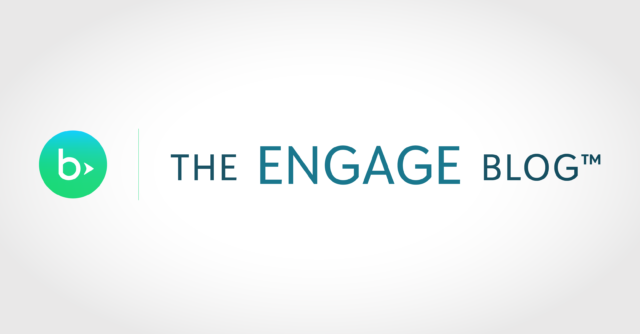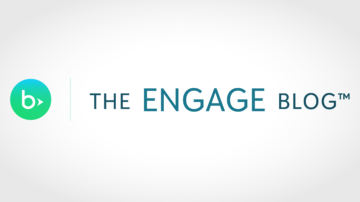What Is Agentic AI and Why It Matters for Social Impact

- What is agentic AI?
- How does agentic AI work?
- How is agentic AI different from other types of AI?
- What are the key features of agentic AI?
- What are the benefits of agentic AI?
- What are some real-world examples of agentic AI for social impact?
- How should you evaluate the ethical considerations of agentic AI?
- How can you get started with agentic AI?
- Agentic AI at Blackbaud—Intelligence for Good®
AI is evolving, fast. You’ve seen what generative AI can do: draft emails, summarize reports, and answer questions. But what if AI could go further? What if it could anticipate needs, make informed decisions, and take meaningful action?
That’s the promise of agentic AI—a new kind of intelligence that can plan, decide, and act on its own. For social impact organizations like yours, this shift is exciting and transformative.
Agentic AI has the potential to automate complex workflows, personalize engagement at scale, and give your team more time to focus on the human connections that drive your mission forward.
In this post, we’ll explore what agentic AI is, how it works, how it differs from other types of AI, and why it matters for purpose-driven organizations like yours.
What is agentic AI?
Agentic AI refers to artificial intelligence systems that can plan, decide, and act toward goals with autonomy.
Unlike traditional AI tools that depend on constant human input, agentic AI takes initiative. It identifies tasks, builds strategies, and executes actions—often across multiple steps and systems.
This marks a significant shift. Agentic AI is much more than a smarter tool. It’s a proactive teammate. It’s designed to work alongside you, understand your mission, anticipate your needs, and drive progress.
For social impact organizations, this means more than efficiency. It means aligning technology with purpose-driven outcomes.
How does agentic AI work?
Agentic AI systems are goal oriented. They’re built to operate independently, making decisions and taking actions based on context, data, and defined objectives you provide.
Here’s how it works:
- Planning: The AI identifies a goal and maps out the steps needed to achieve it, while respecting the complexity of your processes.
- Execution: It carries out those steps across systems—without needing constant human input—freeing your team to focus on higher-value, more strategic tasks without sacrificing oversight.
- Adaptation: It monitors progress, adjusts tactics, and learns from outcomes, supporting your long-term success.
Imagine an AI that notices mid-level donors need attention. It could segment them, create tailored outreach, send communications, and track engagement—empowering your team to execute fundraising strategies that may have previously been neglected.
With agentic AI, you’re able to do so much more than manage tasks. You’re unlocking new possibilities for growth, connection, and innovation.
How is agentic AI different from other types of AI?
To understand what makes agentic AI unique, it helps to compare it to other common types of artificial intelligence. Each type plays a distinct role in how organizations use technology to solve problems, but agentic AI introduces a new level of autonomy and initiative that sets it apart.
| AI Type | Description | Primary Strength | Limitation |
| Predictive AI | Analyzes historical data to forecast future outcomes. Common uses include trend identification, risk assessment, and donor behavior prediction. | Helps you understand what’s likely to happen. | Provides insights but doesn’t take action on its own. |
| Generative AI | Creates content based on prompts, such as emails, social posts, or report summaries, to speed up communication and content creation. | Helps you communicate faster and more efficiently. | Requires human direction and doesn’t initiate tasks independently. |
| Chatbots | Respond to user prompts in real time, offering support, guidance, or answers through conversational interfaces. | Offers responsive, conversational assistance. | Operates reactively and within predefined boundaries. |
| AI Agents | Perform specific tasks like scheduling, sending reminders, or updating records. They’re more action-oriented than chatbots but limited in scope. | Executes predefined tasks with minimal input. | Limited in scope and unable to adapt or make broader decisions. |
Agentic AI goes further.
It can independently plan and execute across systems and contexts, making decisions aligned with your mission. It combines the strengths of predictive and generative AI with autonomy, acting proactively to help your organization achieve its goals.
Primary strength: Acts with initiative, adapts to context, and aligns with your mission.
Distinct advantage: Agentic AI doesn’t just assist or respond—it collaborates, adapts, and leads.
Understanding these distinctions is key for social impact organizations exploring AI. Agentic AI is a strategic capability that’s designed to help you move faster, make better decisions, and get more done for your mission.
What are the key features of agentic AI?
Agentic AI systems are designed to act with initiative, adapt to context, and align with organizational goals.
Unlike traditional AI tools that require constant input, agentic AI can operate independently, make decisions, and take action across systems. These capabilities make it especially valuable for organizations seeking to scale impact while maintaining personalization and agility.
Autonomy with Human Oversight
Agentic AI can initiate tasks and make decisions without waiting for a prompt. But autonomy doesn’t mean acting in isolation. The most effective systems are built to collaborate. They offer recommendations that are transparent and reviewable, allowing teams to stay in control and build trust in the AI’s decisions.
As processes become more complex, confidence in the system’s logic and transparency becomes essential.
Multi-Step Planning and Execution
Agentic AI goes beyond task automation. It can break down goals into actionable steps and carry them out across platforms to support end-to-end workflows like donor engagement and volunteer coordination. This orchestration helps teams move faster and stay focused on strategic work.
Context Awareness and Adaptability
Agentic AI learns from data and adapts to changing conditions. It can interpret real-time feedback, adjust its approach, and tailor its behavior to meet evolving needs.
But its effectiveness is only as strong as the data and processes it’s trained on. When AI is grounded in high-quality and representative data, it can deliver more accurate insights and make better decisions.
System Integration
To be truly effective, agentic AI should operate within and across existing systems, such as CRMs, fundraising tools, and reporting platforms. This enables AI to act with continuity and context and ensures that insights and actions are informed by the full picture, not isolated data points.
Goal and Mission Alignment
Agentic AI is designed to prioritize outcomes that matter. When trained on high-quality, mission-relevant data, it can support goals like donor retention and volunteer engagement. Systems that reflect the values and priorities of the organizations they serve are more likely to deliver meaningful, mission-aligned results.
What are the benefits of agentic AI?
When agentic AI capabilities are applied to the business operations of social impact, the results can be transformative.
Here’s how agentic AI can help organizations go further, faster.
- Efficiency: Agentic AI automates time-consuming workflows freeing up time for relationship building and strategic work.
- Personalization: It tailors outreach and engagement based on individual supporter behavior, preferences, and giving history, helping you build deeper relationships at scale.
- Opportunity identification: By analyzing patterns and trends, agentic AI can surface hidden opportunities, such as identifying mid-level donors ready to upgrade or volunteers who haven’t been contacted recently.
- Scalability: Small teams can manage large-scale operations with ease. Agentic AI expands your capacity without requiring additional headcount.
- Time savings: With routine tasks handled by AI, your team can get time back to focus on what matters most: building trust, telling your story, and driving mission impact.
- Smarter decisions: When trained on robust sector-specific data, agentic AI provides smart, actionable insights, helping you make informed decisions that align with your goals.
What are some real-world examples of agentic AI for social impact?
Agentic AI opens the door to a new kind of support for your organization—one that’s proactive, personalized, and deeply mission-aligned.
Here’s how agentic AI could transform your work.
Donor Stewardship
Imagine an AI assistant that helps you build and manage personalized stewardship workflows. It identifies donors who need more attention—like mid-level supporters who could become major donors with the right outreach. It suggests tailored engagement strategies, drafts content, and tracks responses.
You stay in control, but the heavy lifting is done for you.
Recurring Giving
Picture an AI agent that monitors giving patterns and flags one-time donors who are likely to become recurring supporters. It creates personalized upgrade offers, sends outreach, and tracks conversion rates.
You get actionable insights—and more sustainable revenue.
Campaign Management
Think of an AI teammate that can execute entire fundraising workflows. It builds donor segments, launches targeted campaigns, monitors performance, and adjusts tactics in real time.
You focus on strategy and storytelling. The AI handles execution.
Grant Management
Imagine an AI system that helps your team manage the entire grant lifecycle. It reviews incoming applications, flags missing information, and scores submissions based on your criteria. Once grants are awarded, it automates reporting by pulling relevant data, formatting updates, and even drafting narratives.
Your team spends less time on paperwork and more time building relationships with funders.
Volunteer Coordination
Picture an AI assistant that keeps your volunteer program running smoothly. It identifies scheduling gaps, sends reminders, and follows up with volunteers after events. It can even suggest reengagement strategies for volunteers who haven’t participated recently.
You maintain a personal touch, while the AI ensures no one falls through the cracks.
Impact Reporting
Think of an AI partner that helps you tell your story with data. It pulls metrics from across your systems, drafts personalized impact statements for donors or stakeholders, and formats reports for different audiences. Whether you’re preparing a board presentation or a year-end donor update, the AI helps you communicate your impact clearly and efficiently.
We’re building toward these agentic AI capabilities as part of our Intelligence for Good® strategy—to make AI powerful, convenient, and responsible for social impact.
How should you evaluate the ethical considerations of agentic AI?
As agentic AI becomes more capable, it also becomes more influential. That’s why ethical design is essential.
You’re not just adopting new technology. You’re shaping how it impacts your team, your supporters, and your mission. The right guardrails ensure that AI enhances your work without compromising your values.
Here’s what to prioritize.
- Transparency: You should always know how AI is making decisions. Choose tools that explain their logic and allow you to review and adjust outcomes.
- Fairness: AI should serve everyone equitably. That means using inclusive data, avoiding bias, and ensuring your tools reflect the diversity of the communities you serve.
- Privacy: Your data—and your supporters’ data—must be protected. Work with vendors who respect user permissions and never use your data to train external models.
- Accountability: Agentic AI should support your decisions, not replace them. You should be able to guide, override, or refine its actions at any time.
At Blackbaud, we’ve built our Intelligence for Good® strategy around these responsible AI principles which are embedded into every element of how we design, govern, and deploy our solutions.
It’s so much more than a technical framework. It’s a values-driven commitment.
How can you get started with agentic AI?
Agentic AI is powerful, but it doesn’t need to be overwhelming. You don’t have to reinvent your operations overnight. The easiest way to get started is to choose tools that are thoughtfully designed to support your goals from day one.
Here’s where to start.
Prioritize Transparency and Trust
As AI becomes more autonomous, confidence in its recommendations is key. Evaluate tools that clearly explain how decisions are made and allow you to review, refine, or override actions. Responsible design ensures AI supports your goals without compromising your values.
Look for Built-In Expertise
The most effective agentic AI tools are designed with your sector in mind. Solutions that come pre-configured with relevant data and best practices reduce the burden on your team and accelerate time to value.
Integrate Strategically
Agentic AI works best when it’s embedded in the systems you already use. Look for solutions that integrate seamlessly with your existing tech stack, so you can gain insights and take action without disrupting your workflow.
Want to learn more? Explore how to reimagine your AI tech stack to unlock its full potential.
Empower Teams Through Training and Check-Ins
Support adoption by offering human-led training and scheduling regular team check-ins to evaluate how AI tools are performing. These moments give your team a chance to share feedback, assess impact, and adjust how the technology is used.
Choose an partner that prioritizes AI education and enablement and offers built-in training resources and ongoing support to help your team feel confident as capabilities evolve.
Agentic AI at Blackbaud—Intelligence for Good®
Agentic AI presents a new era in technology that transforms the way nonprofits can work.
As the social impact sector begins to explore the next frontier of AI, we’re leading the way with our Intelligence for Good® strategy—embedding powerful, convenient, and responsible AI directly within our solutions.
While others are retrofitting generic AI, Blackbaud AI is advancing with agentic AI developed specifically to help organizations automate complex workflows, personalize donor engagement, and free up more time for uniquely human work.
Backed by the world’s most robust philanthropic dataset and decades of sector-specific expertise, Blackbaud is uniquely positioned to help social impact organizations unlock new levels of efficiency, insight, and impact—responsibly.



